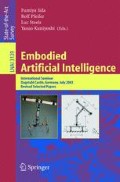Abstract
The dominant motivational paradigm in embodied AI so far is based on the classical behaviorist approach of reward and punishment. The paper introduces a new principle based on ’flow theory’. This new, ‘autotelic’, principle proposes that agents can become self-motivated if their target is to balance challenges and skills. The paper presents an operational version of this principle and argues that it enables a developing robot to self-regulate its development.
Access this chapter
Tax calculation will be finalised at checkout
Purchases are for personal use only
Preview
Unable to display preview. Download preview PDF.
References
Cohen, L., et al.: A constructivist model of infant cognition. Cognitive Development 17, 1323–1343 (2002)
Csikszentmihalyi, M.: Beyond Boredom and Anxiety: Experiencing Flow in Work and Play. Cambridge University Press, Cambridge (1978)
Csikszentmihalyi, M.: Flow. The Psychology of Optimal Experience .Harper and Row, New York (1990)
Csikszentmihalyi, M., Selega, I. (eds.): Optimal Experience: Psychological Studies of Flow in Consciousness. Cambridge University Press, Cambridge (2001)
Elman, J.: Learning and development in neural networks: The importance of starting small. Cognition 48, 71–89 (1993)
Elman, J.L., Bates, E.A., Johnson, M.H., Karmiloff-Smith, A., Parisi, D., Plunkett, K.: Rethinking innateness: A connectionist perspective on development. MIT Press, Cambridge (1996)
Hopfield, J.: Neural Networks and Physical Systems with Emergent Collective Computational Abilities. In: Proceedings of the National Academy of Sciences, USA, vol. 79, pp. 2554–2558 (1982)
Johnson, M.: The Infant Brain. In: Tokoro, M., Steels, L. (eds.) The Future of Learning, vol. 1, pp. 101–116. IOS Press, Amsterdam (2003)
Kirkpatrick, S., Gerlatt Jr., C.D., Vecchi, M.P.: Optimization by Simulated Annealing. Science 220, 671–680 (1983)
Matthews, J.: Art Education as a form of child abuse. Lecture for the National Institute of Education Singapore (1993)
Kaplan, F., Oudeyer, P.Y.: A generic engine for open-ended sensory-motor development. In: Epigenetic Robotics Workshop, Genoa (2004)
McFarland, D., Boesser, M.: Intelligent Behavior in Animals and Robots. MIT Press, Cambridge (1993)
Newell, A.: Unified Theories of Cognition. Harvard University Press, Cambridge (1990)
Papadimitrious, C., Steiglitz, K.: Combinatorial Optimization: Algorithms and Complexity, Dover, New York (1998)
Steels, L., Brooks, R. (eds.): The Artificial life Route to Artificial Intelligence. Building Situated Embodied Agents. Lawrence Erlbaum, New Haven (1995)
Skinner, B.F.: Science and Human Behavior. Macmillan, New York (1953)
Steels, L.: Language games for Autonomous Agents. IEEE Intelligent Systems (2001)(September /October Issues)
Steels, L.: Evolving grounded communication for robots. Trends in Cognitive Science 7(7), 308–312 (2003)
Thelen, B., Smith, L.: A dynamic systems approach to cognition and development. MIT press, Cambridge (1994)
Uchibe, E., Asada, M., Hosoda, K.: Environmental complexity control for visionbased learning mobile robot. In: Proc. of IEEE Int. Conf on Robotics and Automation, pp. 1865–1870 (1998)
Weng, J., McClelland, J., Pentland, A., Sporns, O., Stockman, I., Sur, M., Thelen, E.: Autonomous mental development by robots and animals. Science 291, 599–600 (2001)
Author information
Authors and Affiliations
Editor information
Editors and Affiliations
Rights and permissions
Copyright information
© 2004 Springer-Verlag Berlin Heidelberg
About this chapter
Cite this chapter
Steels, L. (2004). The Autotelic Principle. In: Iida, F., Pfeifer, R., Steels, L., Kuniyoshi, Y. (eds) Embodied Artificial Intelligence. Lecture Notes in Computer Science(), vol 3139. Springer, Berlin, Heidelberg. https://doi.org/10.1007/978-3-540-27833-7_17
Download citation
DOI: https://doi.org/10.1007/978-3-540-27833-7_17
Publisher Name: Springer, Berlin, Heidelberg
Print ISBN: 978-3-540-22484-6
Online ISBN: 978-3-540-27833-7
eBook Packages: Springer Book Archive

